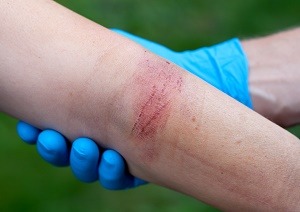
We celebrate the heat in the summer, but too much of a good thing can be dangerous. There are many burn risks we face during summertime activities, but with a little knowledge and attention, you can reduce your risk of ending up in the ER.
Sunburns are the most common types of burns during the summer, but that does not make them any less serious. The Centers for Disease Control and Prevention (CDC) advises that you use a sunscreen rated SPF 15 or higher. Look for ones with UVA and UVB protection.
Clothing can also help keep you safe from overexposure to the sun. Pick hats with wide brims and if you will be working outside for a long period of time, wear long sleeves and long pants to reduce exposed skin.
A clean grill is a safer grill, according to the National Fire Prevention Association. Failing to clean your grill properly before lighting it causes an estimated 19 percent of all grill fires. Choose grilling gear with long handles to keep your hands and arms away from the heat as much as possible. Wear thick heat-proof gloves designed for grilling when cleaning and lighting your grill.
Between 2009 and 2013, fire departments across the U.S. responded to an average of 18,500 fires related to firework use. July 4th accounted for 28 percent of firework-related fires during this time period. Further, emergency rooms in the U.S. treated about 10,500 people for injuries related to fireworks in 2014.
Children are at the highest risk of fireworks-related burns, so make sure young children keep a safe distance from the ignition area. Always supervise older children when lighting fireworks. Have a garden hose and a bucket of water handy to douse any undetonated fireworks or lit ones that get out of control.
You should never create a bonfire unless someone in your group is experienced in the proper building, maintaining, and extinguishing of the wood pile. Make sure you have access to water or fire extinguishers to deal with an out-of-control fire. If using tiki torches or candles, make sure they are mounted sturdily and positioned away from flammable materials.
Chlorine is a common pool chemical found in both residential and public pools. Safe amounts of chlorine in the pool water are fine, but direct splashes onto your skin, ingestion, or inhaling chlorine gas can result in serious burns.
Always keep pool chemicals away from children and pets. Use gloves and proper measuring equipment when adding chemicals to a pool. If anyone feels ill after being around chlorine, remove everyone from the area and take the ill person to the nearest emergency room.
Do not let carelessness with sun, flames, or chemicals ruin your summer fun. Before your next BBQ or summer trip, review these safety tips with your friends and family.